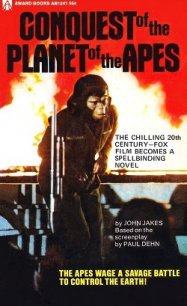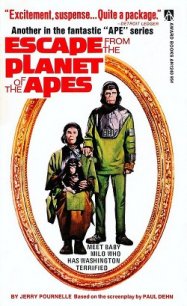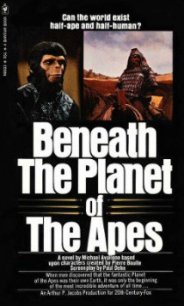Conquest of the Planet of the Apes - Jakes John (читать книги онлайн полностью txt) 📗
Жалоба
Напишите нам, и мы в срочном порядке примем меры.
Conquest of the Planet of the Apes - Jakes John (читать книги онлайн полностью txt) 📗 краткое содержание
The opening titles set the film in "North America – 1991." Armando (Ricardo Montalban) explains that in 1983 (ten years after the end of Escape from the Planet of the Apes, which was set two years ahead of its theatrical release date), a disease killed the world's cats and dogs, leaving humans with no pets. To replace them, humans began keeping apes as household pets. Realizing the apes' capacity to learn and adapt, humans train them to perform household tasks. By 1991, American culture is based on ape slave labor (just as Cornelius described would happen in the previous film). It is also suggested that the North America of the 1990s is at least partly a police state, as apes and humans are being watched at all times.
Armando and Caesar (Roddy McDowall), a young chimpanzee horseback rider in Armando's circus, distribute flyers around a large city to advertise the circus' arrival. Armando warns the chimpanzee to be careful; should anyone learn his identity as the son of Cornelius and Zira, it would mean their deaths. They see apes performing various menial tasks, and are shocked at the harsh discipline on disobedient apes. Seeing an ape being beaten and drugged, Caesar shouts, "Lousy human bastards!" Quickly, Armando takes responsibility for the exclamation, explaining to the policemen that it was he who shouted, not his chimpanzee. The surrounding crowd becomes agitated, and Caesar flees.
Hiding in a stairway, Armando tells Caesar he will go to the authorities and bluff his way out of the situation. Meantime, Caesar has to hide among his own kind (in a cage of orangutans) and soon finds himself being trained for slavery through violent conditioning. He is then sold at auction to Governor Breck (Don Murray). Breck allows the ape to name himself by randomly pointing to a word in a book handed to him and the chimpanzee's finger rests upon the name "Caesar", feigning coincidence. Caesar is then put to work by Breck's chief aide, MacDonald (Hari Rhodes), who sympathizes with the apes to the thinly veiled disgust of his boss.
Meanwhile, Armando is being interrogated by Inspector Kolp (Severn Darden), who suspects his "circus ape" is the child of the two talking apes from the future. Kolp's assistant puts Armando under a machine, "The Authenticator," that psychologically forces people to be truthful. After admitting he had heard the name Cornelius before, Armando realizes he cannot fight the machine. A guard comes in to force him to continue the interrogation, but Armando struggles and jumps through a window, falling to his death. Learning of the death of his foster father, the only human that cared for him, Caesar loses faith in human kindness and begins plotting a rebellion.
Secretly, Caesar teaches combat to other apes and has them gather weapons. While doing an errand with Ceasar, MacDonald expresses concern for the rising problems and wished he could communicate with Caesar. Caesar exposes himself as the lost circus ape and tells MacDonald of his plans to depose Breck. MacDonald, while understanding of Caesar's intent, has his doubts about the effectiveness of revolution, as well as Caesar being dismissive of all humans. Meanwhile, Breck learns from Kolp that the vessel which supposedly delivered Caesar is from a region with no native chimpanzees. Suspecting Caesar is the ape the police are hunting, Breck's men arrest Caesar and electrically torture him until he speaks. Hearing him speak, Breck orders Caesar's immediate death. Caesar survives his execution because MacDonald lowers the machine's electrical output well below lethal levels. Once Breck leaves, Caesar kills his torturer and escapes.
Caesar begins his revolution, with the first objective to capture Ape Management. The apes are victorious after killing most of the riot police. After bursting into Breck's command post and killing most of the personnel, Caesar has Breck marched out to be executed. MacDonald, whose ancestors been slaves, begs Caesar not to succumb to brutality and show mercy to one's former masters. Caesar ignores him, and in a rage declares:
Where there is fire, there is smoke. And in that smoke, from this day forward, my people will crouch, and conspire, and plot, and plan for the inevitable day of Man's downfall. The day when he finally and self-destructively turns his weapons against his own kind. The day of the writing in the sky, when your cities lie buried under radioactive rubble! When the sea is a dead sea, and the land is a wasteland out of which I will lead my people from their captivity! And we shall build our own cities, in which there will be no place for humans except to serve our ends! And we shall found our own armies, our own religion, our own dynasty! And that day is upon you NOW!
As the apes raise their rifles to beat Breck to death, Lisa (Natalie Trundy), Caesar's love interest, voices her objection, "NO!" She is the first ape to speak other than Caesar. Caesar reconsiders and orders the apes to lower their weapons, saying:
But now... now we will put away our hatred. Now we will put down our weapons. We have passed through the night of the fires, and those who were our masters are now our servants. And we, who are not human, can afford to be humane. Destiny is the will of God, and if it is Man’s destiny to be dominated, it is God’s will that he be dominated with compassion, and understanding. So, cast out your vengeance. Tonight, we have seen the birth of the Planet of the Apes!
Conquest of the Planet of the Apes читать онлайн бесплатно
THE TIME: 1990
THE PLACE: A gray, tightly computerized city-state, somewhere in North America
THE INHABITANTS: Apes who serve as terrified slaves. Men who function as brutalized masters
Until the Apes revolt . . . in a battle as savage and monstrous as the bondage they’d been forced to endure for decades!
20th Century-Fox Presents
An Arthur P. Jacobs Production
CONQUEST OF THE PLANET
OF THE APES
Starring
RODDY McDOWALL and DON MURRAY
and
RICARDO MONTALBAN
as Armando
Produced by
APJAC PRODUCTIONS
Directed by
J. LEE THOMPSON
Written by
PAUL DEHN
Based on Characters from
PLANET OF THE APES
Music by
TOM SCOTT

CONQUEST OF THE PLANET OF THE APES
FIRST AWARD PRINTING February 1974
Copyright © 1972, 1974 by
Twentieth Century-Fox Film Corporation.
All rights reserved
AWARD BOOKS are published by
Universal-Award House, Inc., a subsidiary of
Universal Publishing and Distributing Corporation,
235 East Forty-fifth Street, New York, N.Y. 10017
PRINTED IN THE UNITED STATES OF AMERICA
CONTENTS
Title
Copyright
CONQUEST OF THE PLANET
OF THE APES
Prologue
One
Two
Three
Four
Five
Six
Seven
Eight
Nine
Ten
Eleven
Twelve
Thirteen
Fourteen
Fifteen
Sixteen
Seventeen
Eighteen

PROLOGUE
Under a red-tinged moon, the dark towers of the central city thrust against the sky. Black glass facades caught the moon’s reflection, sectioned it like so many endlessly repeated blank faces.
Aerial walkways arched gracefully between the cubistic towers, empty at this hour. From the buildings, and from intersections along the walkways, ramps led down to the perimeter of a vast mall, a checkerboard of small green pocket parks and paving blocks that reflected the moon from their mica flecks. There was no sound except the tack-tacking of the boots of a helmeted state security policeman walking along a parapet above the plaza. His rifle barrel glittered, slung over his shoulder, muzzle upward.
The policeman drew in a breath of the cool, fresh air. Two years ago, in 1989, the last of the huge air-scrubbing plants, constructed at a cost of billions along the mountain chain a hundred miles eastward, had, in combination with stringent laws, made it pleasant to breathe again—at least in this American city. The policeman couldn’t speak for others, never having traveled much.
But he’d heard it was the same in all the great metro sprawls. An ordered society. Law breakers—including polluters—were promptly, severely punished. And the masses of people had been relieved of menial chores by the careful conditioning of thousands of . . .
Abruptly, the policeman stiffened, cocked his head. His helmet flashed moon reflections. Somewhere deep in the glass and steel canyons surrounding the mall, he heard soft, urgent footfalls.
Then another sound made him glance quickly up and down the mall. The second noise was—a jungle sound.
He had seen pictures of the world’s few remaining jungle places on solido shows. The policeman reached up, slowly unslung his rifle. He was sure now. What he’d heard was the whimpering cry of a frightened animal—a running animal.
His face tense, the policeman headed for the nearest ramp. His boots clacked as he ran down to the mall proper. He searched one direction, then another. Nothing but shadows, glass, silence. The footfalls had stopped.
But in thicker shadow beneath another ramp angling down to the pavement far on his right, he swore he heard the light, raspy sound of something breathing.
He whipped around as a shadowy figure broke from under the ramp. The figure began to zigzag between the pocket parks in an unmistakable shambling stride.
Almost before he realized it, the policeman was running himself. He understood the nature of the humped silhouette; understood why it scurried so rapidly across the plaza, dashing past building entrances, temporarily vanishing behind ramp pillars, then plunging frantically on again.
High on another parapet to his left, he heard a word barked by a human voice, then realized it was his own name, called out by a colleague who patrolled blocks Q four through seven. Moving fast, trying to keep the fleeing figure in sight, the first policeman shouted up to the other: “Runaway!”
The cause of the flight, or the identity of the fugitive, he did not know. But he knew that what was happening violated their conditioning, and therefore could not go unchecked. He breathed hard, gripping the rifle in a sweaty palm as he ran. Finally the fleeing figure broke into plain sight, forced to cross a wide paved area in order to reach the sanctuary of the streets opening from the mall’s far side.
The state security policeman halted, braced his booted feet, brought the rifle halfway to his shoulder. He yelled the command that carried more power—with them—than lethal weapons:
“No!”
The echo bounced off the high buildings. And, for a moment, the fleeing figure did react, break stride—almost hesitate. But ultimately, the traditional command failed to work. The figure went shambling on, the emptiness flinging back the whimpering, terrified sound it made.
“Jesus Christ,” said the policeman with a violent swallow. “A real renegade.”
His training had the rifle at his shoulder by then. With only an instant’s pause, he squeezed the trigger. The first thunderous report was followed by a second.
The distant figure spun, toppled to the paving stones, flat on its back, arms flung wide. It let out a piercing bellow of animal agony. The policeman had never shot one of them before. There was a shock reaction as he dashed forward, sourness rising in his throat. Coming down the ramp from above, the boots of his colleague slammed like ghostly echoes of the shots.
The policeman knew what he would find—an ape. He discovered it was a large, mature, male chimpanzee. It wore only green trousers now, the rest of its servant’s garb cast off somewhere as part of its desperate flight to freedom. What the policeman and his companion had not expected to see was the condition of the chimpanzee’s face and hairy upper body.




